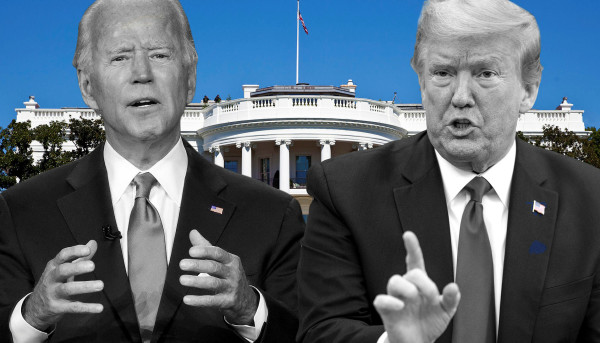

The US's blue chip index has gained almost 3 per cent since opening this afternoon despite the US election sitting on a knife edge.
The race for the White House between incumbent Donald Trump and Democrat challenger Joe Biden is going down to the wire, with analysts still unable to call a number of swing states.
Markets have been volatile today as what some described as a “worst case scenario” — a too-close-to-call election with Mr Trump disputing the potential result — for investors played out.
The FTSE 100 was down 1.2 per cent on opening this morning (November 4), but has since erased those losses to stand 1.6 per cent higher, rallying particularly when US markets opened.
Meanwhile, S&P 500 futures had yo-yoing between gains and losses throughout the day.
Investor confidence was knocked this morning as results from the US election suggested a tight race, with incumbent president Donald Trump performing better than pollsters predicted but ramping up uncertainty over the outcome.
Mr Trump this morning pre-emptively declared victory and suggested, without evidence, that election “fraud” had taken place, pledging to “go to the Supreme Court” to stop some remaining votes being counted.
Despite the uncertainty over the main race, there was slightly more clarity over the results in the Senate. According to Randeep Somel, fund manager at M&G Investments, markets now "seemed satisfied" there was unlikely to be a ‘blue wave’ – a Democratic clean sweep of both houses of Congress and the Presidency – meaning the likelihood of large tax increases and increased regulation from the next administration is low.
'Worst case' scenario
Even if Mr Biden wins the presidency, a Republican Senate would make it difficult for a major fiscal stimulus programme to take place - leading to a prolongation of the current status quo. But many still fear for the weeks ahead.
Adrian Lowcock, head of personal investing at Willis Owen, said: "The election is much closer than many pundits expected and a clear and quick result is looking less and less likely.
"It's the worst outcome for markets and we expect volatility to be high today. Investors may have to endure some vicious swings for the next few days if this drags on, and it has echoes of 2000 about it, when the result of George Bush Jnr versus Al Gore was too close to call.”
In 2000, a recount in the George Bush versus Al Gore election left the outcome in limbo for weeks and the S&P 500 fell 8 per cent over one month.
Read more: Markets to bear the brunt of any Trump election resistance
Richard Carter, head of fixed income research at Quilter Cheviot, said: “In the short term, this is disappointing for markets and raises the prospect of several days or even weeks of uncertainty and possible legal challenges.
“Investors had also been hoping that a clear victory would open the door to a massive stimulus package which would boost the US economy. This now appears unlikely, at least in the short-term, so we would expect to see some volatility today as markets digest the situation.”
Stuart Clark, portfolio manager at Quilter Investors, agreed, saying that any US electoral paralysis was likely to increase volatility for markets.
The election result is currently too close to call, with Mr Trump securing 213 of the 270 electoral college votes needed and Democrat challenger Joe Biden just inches ahead with 224 votes in his pocket.
With an increased number of mail-in voters this year as the coronavirus crisis looms large in the US, the uncertainty could yet drag on for days.
Richard Buxton, head of strategy for UK alpha at Jupiter Asset Management, said: “Any suggestion that the outcome could be contested by either the Trump or Biden campaigns is likely to be viewed dimly by investors, and could give way to a period of renewed volatility in equity and currency markets.”
imogen.tew@ft.com
What do you think about the issues raised by this story? Email us on fa.letters@ft.com to let us know.




